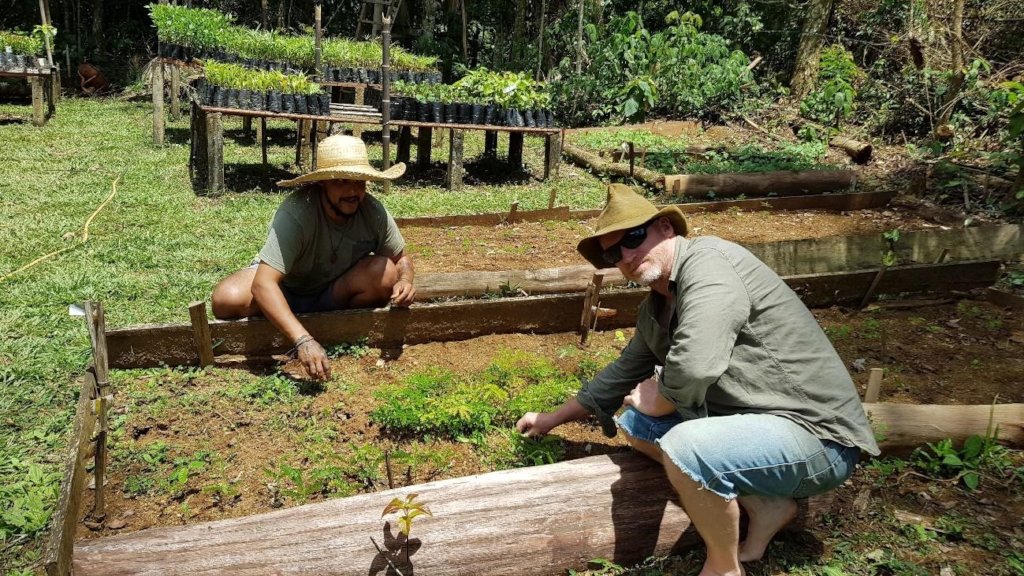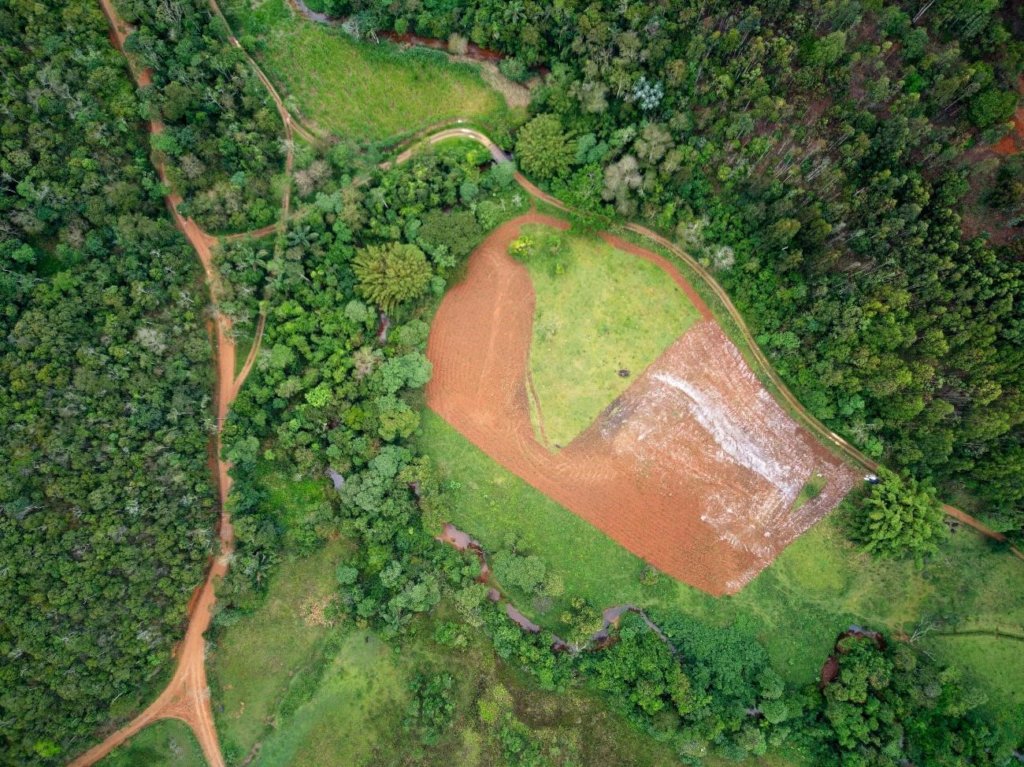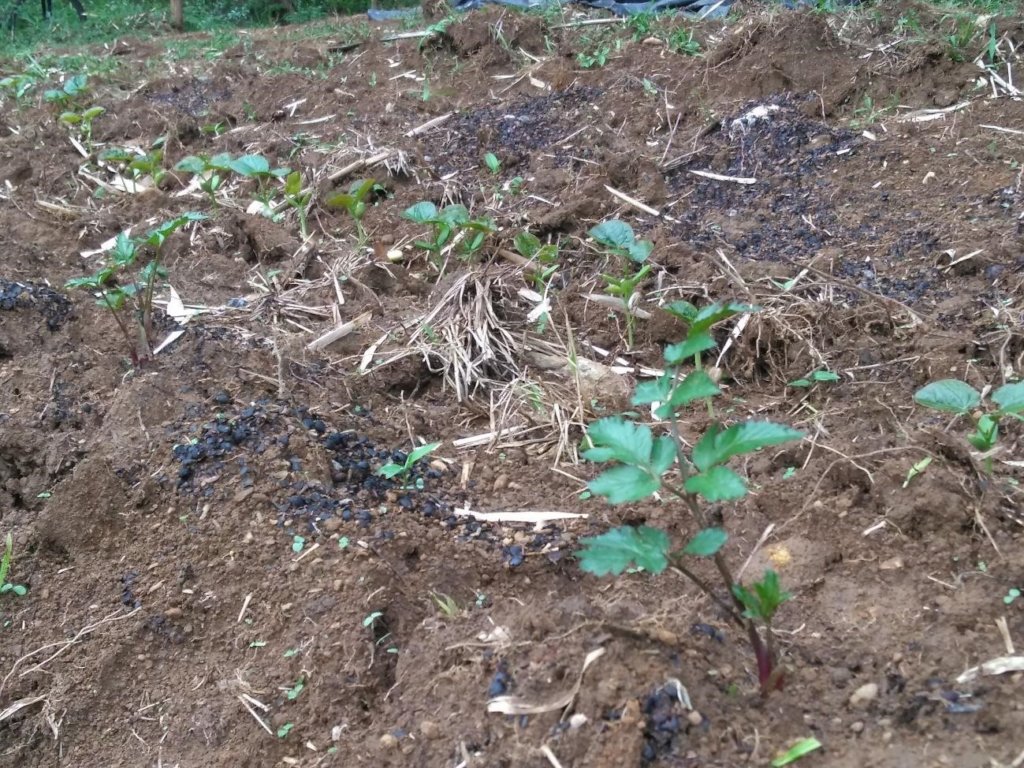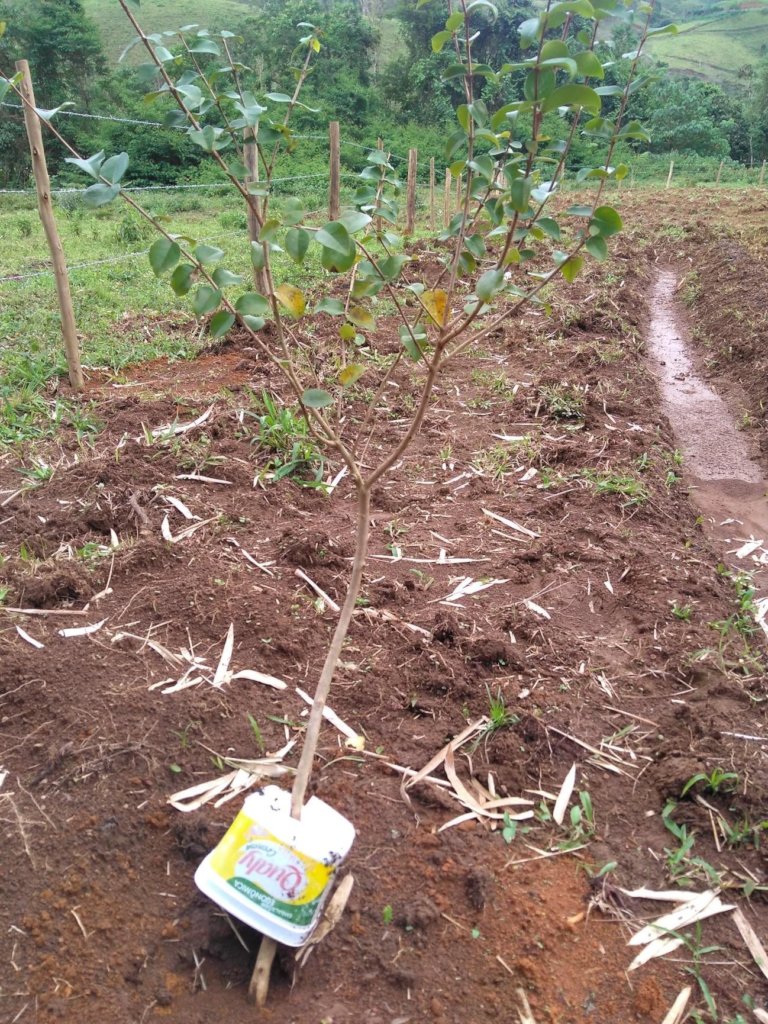![]()
Agro-ecology, feeding people without damaging natural resources
The practices of sustainable agriculture, recently established in Iracambi, have been developing in an espetacular way, indicating future success.
In three months of work, the demonstrative units of low environmental impact agro-productions are gaining the right format as well as being solidified as an example of generation of income for family agriculture.
Production of High Quality Agro-ecological Coffee
Coffee is the most common income generating crop for rural families in Brazil. Because such practice develops well in higher altitudes, the region we are located: ‘mares dos morros’, in translation ‘the sea of hills’, is perfect for growing coffee.
Coffee production gives low income families a decent social condition and aggregate jobs in the rural field.
Due to being shade tolerant, coffee adapts extremely well in forest systems, either being grown perennially or just annually. However, the locals in the region do not take advantage of this fact, either because of a lack of interest or knowledge.
Locals still use standard out-dated practices, with fields under full sunlight and under high application of chemical fertilisers and pesticides.
The following are coffee-growing techniques utilised by the locals in the region:
- Coffee Monoculture: Monoculture induces pest vulnerability to plants because it damages the habitat of natural predators. On top of that, because this region has deep soils, the planting of only one species lead to drastic erosions and fertility loss.
- Use of Pesticides: The easy pest invasion in the monoculture fields lead to local farmers turn to radical measures so they will not loose productivity. They apply a high quantity of extremely damaging pesticides, intoxicating themselves, the soil and its biota, and consequently everyone who uses their products. Not only, these chemicals are expensive, leading the farmers to be in debt due to the acquirement of rural credits.
- Synthetic Fertilisers Application: Like pesticides, chemical fertilisers are very expensive. Most of the farmers’ income is used to acquire these. Because they are very soluble and volatile, such products are easily lost in the environment, thus leading to low production efficiency by the farmers, as well as creating cracks on soil and inputting a high quantity of salt in water resources.
These three factors mentioned above cause high environmental and social impacts. Figure 1 illustrates this current scenario in the region.
Because the farmers loose the productivity of their soils and with time, enter into debt, they abandon their lands and move to the city in extremely poor conditions.
Due to this context, our mission is to create a model for these families to promote a sustainable, financially viable and socially just rural activities.
At Iracambi, it is utilised alternative agro-forestry techniques which are more appropriate for these families. The polyculture of species in one specific area does not allow severe ecosystem imbalances, in which pests do not have the proper habitat for their proliferation. In such mixing of species, there is more soil micro-biodiversity and its activity control the pathogenic fungai and bacteria activity of the soil, while above the soil, the higher diversity of plants create more habitat for natural predators.
In Figure 2 it can be observed four ecosystem extracts in the coffee plantation.
Extract 1: This ecosystem contains large trees with deep roots, with the capacity to absorb nutrients and water in deep soil horizons, and through the evapotranspiration and leaf and twig loss, the nutrients gathered are transferred to the ecosystem, forming a natural cycle of water and nutrients.
Moreover, these trees have the capacity to prevent soil erosion. Not only, these trees loose their leaves only at the time of the development of the coffee seeds, thus not interfering with the productivity of the field.
Furthermore, these trees have extrafloral extracts which attract natural predators capable of fighting pests. Another function of these trees is to provide fuel for cooking as well as fruits for the Iracambi residents.
Finally, these trees turn the soil more permeable contributing to the refilling of the natural springs surrounding the coffee plantation.
Extract 2: This extract contains smaller species of trees which produce a high level of biomass. Such biomass increases the organic matter of the soil. Through the subsequent increase of microorganisms, the mineralization of the soil increases, thus providing nutrients for other plantations.
Further, these trees decrease the spreading of invasive species and protect the soil from the direct impact of thunderstorms. Finally, the strong solar irradiation coming from their roots retain for longer the humidity of the soil, balancing the rate of the water infiltration in the soil.
Extract 3: This ecosystem extract is the coffee plantation. The coffee trees are plants that can withstand up to 40% of shade without loosing their productivity. Other than the benefits mentioned earlier, a great benefit of its cultivation under shade is that the fruits take longer to develop, increasing the quality of the coffee.
Extract 4: This extract contains plants from the leguminoseae family which act as a natural fertiliser to the coffee plants. They also act as a natural herbicide. In this extract, it is also possible to cultivate annual crops such as beans, corn, banana, and others.
Because of the hilly landscape of the region, local coffee producers can only care for the crops manually. This is why we are focusing on increasing the quality of small coffee fields in the surrounding community.
Recently, high-quality coffee has had more power in the market and can be an excellent source of income for small rural producers, since it is worth three times more than conventional coffee.
High quality coffee contains only selected grains that are fully mature and are dried in greenhouses to better their quality. Figures, 3, 4, 5, 6 and 7 depict the process of agro-ecological cultivation from the start to the drying process.
Through this technique, we produce a special agro-ecological coffee with 85 points without the use of pesticides and chemical fertilisers.
With this model we are sustainably influencing the local coffee producers of the region, through an open dialogue during several visits to their properties as well as welcoming them at Iracambi.
Some producers are already successfully adopting some of these techniques. Figures 8 to 12 show the experiences of some.
The next step is (with your help) to promote field meetings with the community to disperse agro-ecological knowledge, including organic fertilising and biological remediation.
In this way, we develop a good relationship with the local farmers, promoting development in the rural community.
Agro-ecological Garden
A 100% organic garden has been implemented at Iracambi, which includes alternative techniques to properly generate income to the rural community. In the same way as the coffee, we are dispersing agro-ecological techniques to the locals, including the exchange of saplings and non-sterile seeds.
The following is a brief description of the sustainable techniques that are being used:
Selected area: The area selected was absolutely degraded with invasive plants and with a very compacted soil. Figure 13 shows how the area was before the garden was implemented.
We removed the unwanted plants and used the organic matter for composting, which was later enriched with efficient microorganisms of the forest. Figure 14 illustrates the process of composting. The final product was a rich compost with essencial nutrients and micro-organisms for the vegetative growth of the garden.
After, the soil was prepared and the fields for the crops established. Calcium carbonate was also applied to reduce the acidity of the soil which decreases the development of plants. Figure 15 depicts the process.
After the last steps, the soil of the fields was enriched with the compost we made ourselves. In sequence, several species of vegetables and medicinal plants were planted, including natural repellants to strategically control pests and several non-conventional edible plants.
Figure 16-20 demonstrate step-by-step the process of establishing the garden from beginning to the current moment. All of this was only possible with your contribution!
With your help, we plan to share our knowledge through the entire rural community to assist local farmers in increasing their income and by agro-ecologically enriching their diet with a more diverse range of nutrients.
Production of Honey with Native Bees
As a way to generate alternative income and promote conservation of the native honey-bees, we are creating models of apiculture that are uncommon in the region.
These bees are extremely important pollinators, thus being vital for the functioning of the forest ecosystems. This unity of production is still in initial development and we are currently in the process of capturing the bees.
With the help of a local apiculturist who is passionate about saving the native bees, we established a small place for capturing the bees with pheromones. The figures 21 and 22 illustrate the process.
Conclusion
There is still a lot to be done. The agro-ecology program of Iracambi has only been established three months ago.
With your help we are progressing towards a model of sustainable agriculture in our land and in the community.
Our experience is really important to promote viable examples to the local farmers.
Family agriculture is in crisis. Families are being marginalised by conventional agricultural system and are loosing their power. We are here to empower them, since 70% of the food consumed daily in Brasil comes from family agriculture.
Our demonstrative units of agro-ecology envisions the progress of these families, by straightening their relationship with the environment and by providing them a better and dignified life.
Translation: Carla Faccina
![]()
![]()
![]()
![]()
![]()
![]()
![]()
![]()
![]()
![]()
![]()
![]()
![]()
![]()
![]()
![]()
![]()
![]()
![]()
![Share on Twitter]()
![Share on Facebook]()



